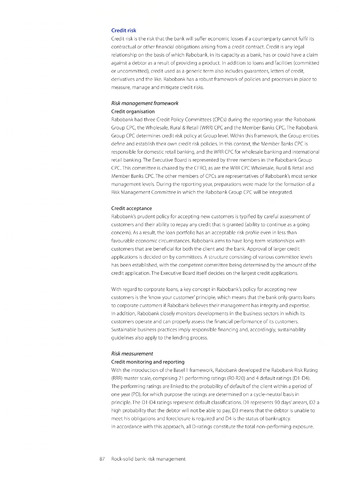Credit risk
Credit risk is the risk that the bank will suffer economic losses if a counterparty cannot fulfil its
contractual or other financial obligations arising from a credit contract. Credit is any legal
relationship on the basis of which Rabobank, in its capacity as a bank, has or could have a claim
against a debtor as a result of providing a product. In addition to loans and facilities (committed
or uncommitted), credit used as a generic term also includes guarantees, letters of credit,
derivatives and the like. Rabobank has a robust framework of policies and processes in place to
measure, manage and mitigate credit risks.
Risk management framework
Credit organisation
Rabobank had three Credit Policy Committees (CPCs) during the reporting year: the Rabobank
Group CPC, the Wholesale, Rural Retail (WRR) CPC and the Member Banks CPC.The Rabobank
Group CPC determines credit risk policy at Group level. Within this framework, the Group entities
define and establish their own credit risk policies. In this context, the Member Banks CPC is
responsible for domestic retail banking, and the WRR CPC for wholesale banking and international
retail banking. The Executive Board is represented by three members in the Rabobank Group
CPC. This committee is chaired by the CFRO, as are the WRR CPC Wholesale, Rural Retail and
Member Banks CPC.The other members of CPCs are representatives of Rabobank's most senior
management levels. During the reporting year, preparations were made for the formation of a
Risk Management Committee in which the Rabobank Group CPC will be integrated.
Credit acceptance
Rabobank's prudent policy for accepting new customers is typified by careful assessment of
customers and their ability to repay any credit that is granted (ability to continue as a going
concern). As a result, the loan portfolio has an acceptable risk profile even in less than
favourable economic circumstances. Rabobank aims to have long-term relationships with
customers that are beneficial for both the client and the bank. Approval of larger credit
applications is decided on by committees. A structure consisting of various committee levels
has been established, with the competent committee being determined by the amount of the
credit application. The Executive Board itself decides on the largest credit applications.
With regard to corporate loans, a key concept in Rabobank's policy for accepting new
customers is the 'know your customer' principle, which means that the bank only grants loans
to corporate customers if Rabobank believes their management has integrity and expertise.
In addition, Rabobank closely monitors developments in the business sectors in which its
customers operate and can properly assess the financial performance of its customers.
Sustainable business practices imply responsible financing and, accordingly, sustainability
guidelines also apply to the lending process.
Risk measurement
Credit monitoring and reporting
With the introduction of the Basel II framework, Rabobank developed the Rabobank Risk Rating
(RRR) master scale, comprising 21 performing ratings (R0-R20) and 4 default ratings (D1-D4).
The performing ratings are linked to the probability of default of the client within a period of
one year (PD), for which purpose the ratings are determined on a cycle-neutral basis in
principle.The D1-D4 ratings represent default classifications. D1 represents 90 days'arrears, D2 a
high probability that the debtor will not be able to pay, D3 means that the debtor is unable to
meet his obligations and foreclosure is required and D4 is the status of bankruptcy.
In accordance with this approach, all D-ratings constitute the total non-performing exposure.
Rock-solid bank: risk management

